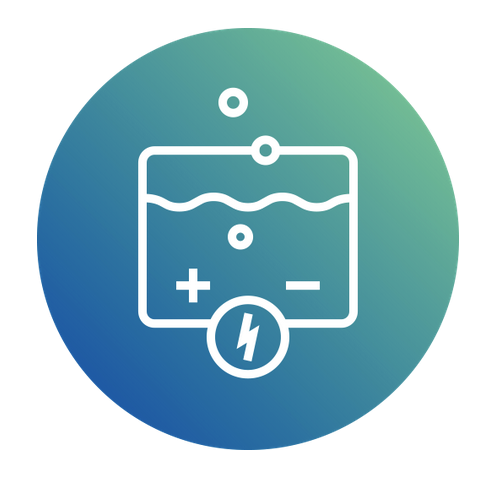RESET-CO2: scaling up electrochemical CO2 conversion for renewable production of ethylene
TNO has recently started a new project to render ethylene production sustainable, starting from CO2 and using renewable electricity

As a key intermediate for plastics, textiles, e-fuels and several other products, ethylene is the most commonly used chemical building block. Its current production is fossil-based and energy-intensive. Within the VoltaChem programme, TNO has recently started a new project (RESET-CO2) to render ethylene production sustainable, starting from CO2 and using renewable electricity. Supported by the RVO-MOOI scheme and in collaboration with industry and academia, RESET-CO2 aims to demonstrate the feasibility of electrochemical production of ethylene at pilot scale.
With a volume of no less than 180 million tonnes per year, ethylene is the most widely produced molecule in the chemical industry. Any route to defossilizing its production and rendering it sustainable would surely have to be large-scale. That, in a nutshell, is the background for the project RESET-CO2, an acronym for Renewable Ethylene via Scalable Electrochemical Technologies for CO2 conversion. It aims to develop technology for direct electrosynthesis of ethylene by means of low-temperature electrolysis starting from CO2 and water. The concept has been proven at laboratory scale (TRL3) and the four-year project aims at demonstration in a pilot installation (TRL5). This will help derisking the technology, aiming towards a first-of-a-kind industrial plant to be established before 2040.
According to project manager Dr. Michele Tedesco, senior scientist Electrochemical Engineering at TNO, the technology can become a prime “green” ethylene production method, especially if combined with large-scale offshore wind energy deployment. “To make this outcome a reality, we combine strategic knowledge and innovations at all levels: from material development and process design, to system integration and value chain aspects.”
Towards full-scale deployment
In the coming three years, TNO and its partners in RESET-CO2 aim to take important steps along this path. The companies VSparticle, Brusche, e-Ethylene, Johnson Matthey, as well as TU Delft participate in the project that has a total budget of €3.3 million, including a €2.1 million subsidy from the Dutch government (RVO-MOOI scheme). The initial focus will be on manufacturing novel (cathode) catalyst layers and incorporate them into improved architectures of the membrane-electrode assembly, which is at the heart of the ethylene electrosynthesis technology. This will then be validated experimentally at increasing geometric sizes and power scales, up to multi-kW demonstration in the ZEUS pilot of TNO in Rijswijk, a one-of-its-kind testing infrastructure for piloting CO2 electrolysis.
Tedesco expects to gain crucial insights into how to upscale the technology and optimize process conditions.
“This will then help us to draw up a conceptual design for a novel high-performance electrochemical reactor to be implemented in a full-scale plant. At the same time, we will perform an integrated techno-economic and environmental analysis, benchmarking our approach against competing green ethylene technologies. In particular, we will employ a multi-scale dynamic modelling framework to identify how to optimally operate the technology when powered by intermittent renewable energy such as from offshore wind farms.”
Boosting competitiveness
A forte of the strong industry-driven RESET-CO2 consortium is that it brings together the necessary strategic and multidisciplinary knowledge across the whole value chain. When successful, the project will boost the competitiveness of the Dutch industry as world leader in CO2 electrolysis technology, covering the full scope of component development, reactor engineering, process design, and system integration. It is expected that the project will help derisking the technology and provide insights for future scale-up phases, towards a first-of-a-kind industrial demonstration to be established before 2040. Besides a strong multidisciplinary consortium, the project is further supported by key industrial stakeholders as members of the Expert Advisory Board: Dow, LyondellBasell, GC, Repsol, Twence, GIG Karasek, and RWE.
“With their long-lasting expertise in the field of research, innovation and industrialisation, the input of these companies is crucial to establish a sound basis for our research and demonstration goals”, says Tedesco.
Towards an electrified chemical sector
RESET-CO2 is part of a larger TNO program aiming to scale-up and demonstrate electrochemical CO₂-to-ethylene technology. A four-million euro project funded by the Dutch government has been recently granted at TNO, where TNO has teamed up with strategic partners such as CEA (France), TU Delft (The Netherlands), and TU Valencia (Spain), to accelerate the development of the electrochemical CO₂-to-ethylene technology. PhD researchers at CEA, TU Delft, and TU Valencia will work alongside TNO scientists and engineers to advance such technology in the coming four years.
Tedesco: “It all fits with TNO’s commitment to help the industry de-risking scale-up and accelerating commercialisation of new electrochemical technologies. Together we work towards an electrified chemical sector, offering a pathway to replace fossil-based raw materials with sustainable alternatives.”
Do you want to know more about RESET-CO2? Please contact Michele Tedesco. General inquiries about technology development in electrochemical CO2 conversion can be sent to [email protected].
Source: VoltaChem, press release, 2025-09-22.
